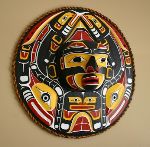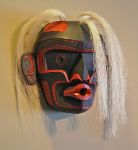
 Stan C Hunt comes from a Kwagiulth family from Fort Rupert, British Columbia on Vancouver Island. His grandfather, Mungo Martin is widely credited with saving Kwagiulth art from extinction in the early part of the century. His father, Henry Hunt, was a renowned master carver who worked at the Royal British Columbia Provincial Museum in Victoria for many years. His older brothers, Tony and Richard Hunt, are among the leading artists in the Kwagiulth form.
Stan C Hunt comes from a Kwagiulth family from Fort Rupert, British Columbia on Vancouver Island. His grandfather, Mungo Martin is widely credited with saving Kwagiulth art from extinction in the early part of the century. His father, Henry Hunt, was a renowned master carver who worked at the Royal British Columbia Provincial Museum in Victoria for many years. His older brothers, Tony and Richard Hunt, are among the leading artists in the Kwagiulth form.
Stan was born in Victoria on September 25th, 1954 while his father was working for the museum. Mungo Martin provided the link with tradition for the family; from his songs sung around the kitchen table to the extravagant ceremonies of the potlatch. After Stan, at the age of ten, danced as a Hamatsa for the first time, he became more involved in the rituals of his people. When Stan was younger he carved toy boats and canoes. In 1976 he went to see his father Henry in his carving shed and asked if he could be a carver. His father replied, "The first thing you have to do is make your own tools." Stan spent the next three years learning knife techniques and carving plaques for the Victoria tourist trade.
He also assisted his father in the carving of six totem poles. Stan's interpretation of the Kwagiulth style is starkly traditional. No power tools or sandpaper are used. Only the traditional tools, the adze, curved knife and straight knife are used. The images are original but with traditional roots in stories of the Kwagiulth people; images passed down from one generation to the next.

|
Killer Whale Moon Stan C Hunt 2016 Native Mask - Killer Whale Moon Stan C Hunt 2016 Native Mask - Killer Whale Moon Stan C Hunt 2016 This is a one piece Moon mask carved... |

|
Wild Women Mask Stan C Hunt Native Mask - Wild Women Mask by Stan C Hunt Native Dance Mask - Wild Women Mask by Stan C Hunt This mask of Dzunukwa or Wild Women... |